Maraging steel
Osprey® MAR-60
Osprey® MAR-60 is an ultra-high hardness maraging steel alloyed with cobalt, nickel and molybdenum. It is typically used for conformal-cooled mould tooling applications that require high levels of performance.
- ASTM, AISI
- 13Ni400
- EN Name
- X 2 NiCoMo 13 15 10
Powder designed for
- Additive Manufacturing (AM)
- Metal Injection Moulding (MIM)
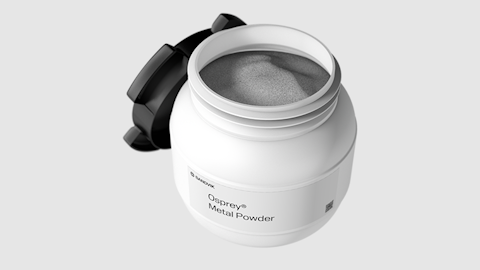
This metal powder is manufactured by Inert Gas Atomization (IGA), producing a powder with a spherical morphology which provides good flow characteristics and high packing density.
-
Product information
Osprey® MAR-60 is an ultra-high hardness maraging steel alloyed with cobalt, nickel and molybdenum. The alloy is typically used for conformal-cooled mould tooling applications that require high levels of performance, such as injection mold tools, extrusion tools, die casting dies, cores and core pins.
This metal powder is manufactured by Inert Gas Atomization (IGA), producing a powder with a spherical morphology which provides good flow characteristics and high packing density. In addition, the powder has a low oxygen content and low impurity levels, resulting in a metallurgically clean product with enhanced mechanical performance.
Technical data
Page updated Sep 14, 2023 12:55 PM CET (supersedes all previous editions)
-
Chemical composition (nominal), %
- Fe
- Bal.
- C
- ≤0.03
- Cr
- ≤0.3
- Ni
- 13.0
- Mo
- 10.0
- Co
- 15.0
- Ti
- 0.20
- Al
- 0.01
- Mn
- ≤0.1
- Si
- ≤0.1
- P
- ≤0.01
- S
- ≤0.01
- O
- ≤0.1
- N
- ≤0.1
-
Powder characteristics and morphology
Powder for Additive Manufacturing
Osprey® metal powder for Additive Manufacturing is characterized by a spherical morphology and high packing density, which confer good flow properties. For powder bed processes these are essential when applying fresh powder layers to the bed to ensure uniform and consistent part build.
For blown powder processes, such as Direct Energy Deposition (DED), good flow ensures uniform build rates. Tight control of the particle size distribution also helps ensure good flowability. Low oxygen powders result in clean microstructures and low inclusion levels in the finished parts.
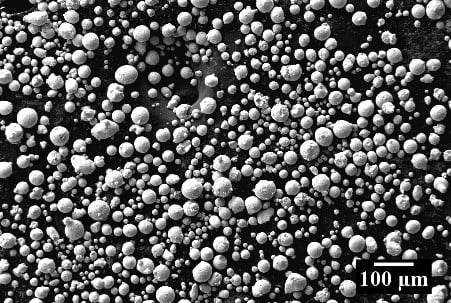 SEM micrograph of -53 +15 µm powder with spherical morphology
SEM micrograph of -53 +15 µm powder with spherical morphology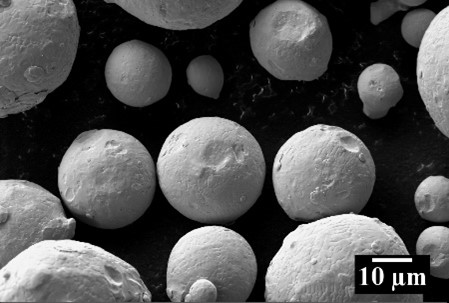 SEM micrograph of -53 +15 µm powder with smooth surface and low level of powder satellites
SEM micrograph of -53 +15 µm powder with smooth surface and low level of powder satellites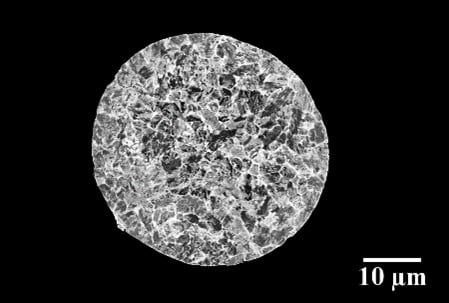 Micrograph of of -53 +15 µm powder in cross section, in back-scatted electron mode, highlighting the fine cellular structure
Micrograph of of -53 +15 µm powder in cross section, in back-scatted electron mode, highlighting the fine cellular structurePowder for Metal Injection Moulding (MIM)
Osprey® MIM powder has a spherical morphology, resulting in high packing density. This enables the manufacture of feedstocks with high powder loading, which not only minimizes binder costs but also reduces part shrinkage during debinding and sintering. Spherical powder also has excellent flow characteristics, resulting in reduced tool wear and consistent mould filling.
Osprey® MIM powder's low oxygen content allows better control of carbon and consistency during sintering. Low oxygen levels, together with high packing density, also facilitate faster sintering.
-
Particle size distribution
Powder for Additive Manufacturing
Osprey® metal powder for Additive Manufacturing is available in a wide range of particle size distributions that are tailored to the individual Additive Manufacturing systems. They can also be tailored to the particular requirements of the end application, both in terms of mechanical performance and surface finish.
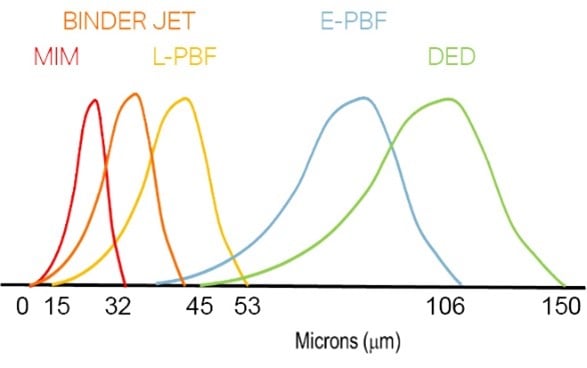 Typical particle size distributions for Additive Manufacturing.
Typical particle size distributions for Additive Manufacturing.Typical particle size distributions for Additive Manufacturing Process technology Size (µm) Binder jetting ≤ 16, ≤ 22, ≤ 32, ≤ 38, ≤ 45 Laser - Powder Bed Fusion (L-PBF) 15 to 53 and 10 to 45 Electron beam - Powder Bed Fusion (E-PBF) 45 to 106 Direct Energy Deposition (DED) 53 to 150
Powder for Metal Injection Moulding (MIM)
Osprey® metal powder for Metal Injection Moulding (MIM) is available in a wide range of particle size distributions, from under 5 μm up to 38 μm. The table shows our standard particle size distributions for MIM powders.
Typical particle size distributions for Metal Injection Moulding (MIM)* Size (μm) D10 (μm) D50 (μm) D90 (μm) ≤ 38 5.5 13.0 31.0 ≤ 32 5.0 12.0 29.0 80% ≤ 22 4.5 11.5 27.0 90% ≤ 22 4.0 10.5 22.0 90% ≤ 16 3.5 8.0 16.0 - Particle size measurements performed using a Malvern laser particle size analyzer, typical D10, D50 and D90 provided.
Tailor-made particle size distributions are available on request. Contact us to discuss your specific requirements.
-
Mechanical properties
Typical mechanical properties of material produced by Laser - Powder Bed Fusion (L-PBF) in as-built condition, evaluated at room temperature.
Mechanical properties, metric units Direction Yield strength (Rp0.2), MPa Tensile strength (Rm), MPa E-modulus, GPa Elongation (A), % Area reduction (Z), % Horizontal 1,279 1,423 204 16.8 58 Vertical 1301 1,405 190 16.9 53 Mechanical properties, imperial units Direction Yield strength (Rp0.2), ksi Tensile strength (Rm), ksi E-modulus, ksi1) Elongation (A), % Area reduction (Z), % Horizontal 185 206 30 16.8 58 Vertical 189 204 28 16.9 53 1) X103
Typical mechanical properties of material produced by Laser - Powder Bed Fusion (L-PBF) in heat-treated condition (aged 480°C/896°F for 6 h).
Mechanical properties, metric units Direction Yield strength (Rp0.2), MPa Tensile strength (Rm), MPa E-modulus, GPa Elongation (A), % Area reduction (Z), % Horizontal 2,477 2,640 212 1.8 6 Vertical 2,310 2,470 197 1.8 6 Mechanical properties, imperial units Direction Yield strength (Rp0.2), ksi Tensile strength (Rm), ksi E-modulus, ksi1)
Elongation (A), % Area reduction (Z), % Horizontal 360 382 31 1.8 6 Vertical 335 358 29 1.8 6 1) X103
Hardness
Typical Vicker’s Hardness levels (ASTM E92, ISO 6507-1, JIS Z2244, GB/T 4340.1) as well as HRC values (ASTM E18, ISO 6508-1, JIS Z2245, GB/T 230) in the Laser - Powder Bed Fusion (L-PBF) as-built and heat-treated conditions.
Hardness Condition Direction HV HRC As built Horizontal 390 41 As built Vertical 390 41 Heat treated Horizontal 770 60 -
About maraging steels
Maraging steels are a class of ultra-high strength, high hardness and high toughness steels which can be welded without preheating either in annealed (easy to machine) or heat-treated condition. These properties make them ideal candidates for the Laser - Powder Bed Fusion (L-PBF) process to manufacture parts with complex geometries for demanding applications which require an excellent combination of strength, toughness, and thermal stability.
The strengthening mechanisms in this type of steel differ from those in classical carbon steels where martensitic, bainitic or pearlitic phases are formed on cooling and tempering is employed to control carbide precipitation. Less than 50% of the overall contribution to strengthening is provided by the extremely tough Fe-Ni martensite, while aging of this martensite, containing Mo, Al, Ti and Co in supersaturated solid solution, provides additional strengthening by precipitation of nanosized intermetallic particles in the martensitic matrix.
-
Testing
All Osprey® metal powders are supplied with a certificate of analysis containing information on the chemical composition and particle size distribution. Information on other powder characteristics is available upon request.
-
Packaging
A wide range of packaging options is available, from 5kgs plastic bottles to 250kg metal drums.
5 kg (11 lbs) Plastic bottles
6 kg (13 lbs) Plastic bottles
10 kg (22 lbs) Plastic bottles
20 kg (44 lbs) Metal cans
100 kg (220 lbs) Steel drums
150 kg (330 lbs) Steel drums
250 kg (551 lbs) Steel drums
All packaging materials are suitable for air, sea and road freight.Contact us for more information and to discuss your packaging requirements.
Disclaimer: Data and recommendations are for guidance only, and the suitability of a powder for a specific process or application can be confirmed only when we know the actual conditions. Continuous development may necessitate changes in technical data without notice. This datasheet is only valid for Osprey® powder.
Osprey® Online
Buy Osprey® MAR-60 for additive manufacturing from our online store, available directly from stock.
Range of maraging steels
| Osprey® | Standards* | Fe | C | Cr | Ni | Mo | Co | Ti | Al | Mn | Si | P | S | O | N | W | V | |
|---|---|---|---|---|---|---|---|---|---|---|---|---|---|---|---|---|---|---|
| Osprey® 18Ni300 | UNS K93120 | Bal. | ≤0.03 | ≤0.3 | 18 | 4.8 | 9.0 | 0.7 | 0.1 | - | ≤0.1 | ≤0.01 | ≤0.01 | - | - | - | - |
Osprey® 18Ni300
|
| Osprey® HWTS 50 | - | - | 0.18-0.25 | 2.5-3.0 | - | 2.0-2.5 | - | - | - | 0.10-0.50 | 0.05-0.50 | - | - | - | < 0.06 | - | 0.4-0.6 |
Osprey® HWTS 50
|
| Osprey® MAR-50-Co free | - | Bal. | ≤0.06 | 4.0 | 9.5 | 4.5 | ≤0.1 | ≤1.0 | ≤0.3 | ≤0.5 | ≤0.5 | ≤0.03 | ≤0.03 | - | - | - | - |
Osprey® MAR-50-Co free
|
| Osprey® MAR-60 | ASTM, AISI 13Ni400 | Bal. | ≤0.03 | ≤0.3 | 13.0 | 10.0 | 15.0 | 0.20 | 0.01 | ≤0.1 | ≤0.1 | ≤0.01 | ≤0.01 | ≤0.1 | ≤0.1 | - | - |
* Information about more standards is available in the datasheet for the respective alloy.
Get in touch with our experts in metal powder today
